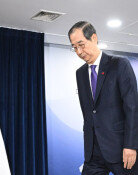[Editorial] Groundless Optimism Is No Solution
[Editorial] Groundless Optimism Is No Solution
Posted February. 03, 2009 05:16,
Exports last month plunged 32.8 percent from a year ago, the steepest drop since Korea started compiling trade data in 1980. Worse, the trade deficit was 2.97 billion dollars in January, 4.4 times bigger than the trade surplus of 670 million dollars last month. The government predicts imports will fall more significantly than exports and the trade balance will go from a deficit of 13 billion dollars last year to a surplus of 11.9 billion dollars this year. Given its trade balance last month, however, its prediction has been proven wrong. No one is willing to have a firm confidence in the governments prediction.
If Korea keeps recording international payments deficits, fears of a newly emerging currency crisis will materialize. For Korea, an international payments surplus is the prerequisite to stay a stable economy. This is why Koreans feel uneasy over the widespread forecast that the trade balance is unlikely to significantly improve.
In a luncheon with members of the ruling Grand National Party at the presidential office, President Lee Myung-bak urged them to call on the power of affirmation. Undeniably, all Koreans should believe they can overcome their difficulties and gather their force. First of all, however, they need to face the music.
The Korean government seems not to take recent economic difficulty seriously. The government might find comfort in forecasts of robust growth next year after a decline this year. Korea, however, went through the same process a decade ago amid the Asian currency crisis. After dropping 6.7 percent in 1998, a year after the currency crisis hit, the Korean economy grew 10.9 percent in 1999 and 9.3 percent in 2000. Nevertheless, as large-scale insolvent companies went under or were sold overseas, the nations economic fundamentals greatly aggravated and the weakening won and surging unemployment burdened Koreans.
Worse, Korea is facing economic conditions that are far worse than those a decade ago. The overall global economy has been affected by the business downturn, and increasingly more economies are resorting to trade protectionism to look after their own products and companies, giving more challenges to export-driven economies. Groundless optimism will only aggravate the peoples confidence in the government. Against this backdrop, the government should do its best to realize goals such as strengthening the basis of an international payments surplus.







